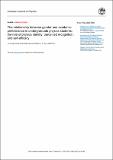Files in this item
The relationship between gender and academic performance in undergraduate physics students : the role of physics identity, perceived recognition, and self-efficacy
Item metadata
| dc.contributor.author | Bottomley, Ewan | |
| dc.contributor.author | Kohnle, Antje | |
| dc.contributor.author | Mavor, Ken | |
| dc.contributor.author | Miles, Paula Jean | |
| dc.contributor.author | Wild, Vivienne | |
| dc.date.accessioned | 2023-01-06T16:30:09Z | |
| dc.date.available | 2023-01-06T16:30:09Z | |
| dc.date.issued | 2022-12-26 | |
| dc.identifier | 282445905 | |
| dc.identifier | 5fad2ea8-b236-42eb-9d55-4e19ec39bf84 | |
| dc.identifier | 85145659491 | |
| dc.identifier | 000903934100001 | |
| dc.identifier.citation | Bottomley , E , Kohnle , A , Mavor , K , Miles , P J & Wild , V 2022 , ' The relationship between gender and academic performance in undergraduate physics students : the role of physics identity, perceived recognition, and self-efficacy ' , European Journal of Physics , vol. 44 , no. 2 , 025701 . https://doi.org/10.1088/1361-6404/aca29e | en |
| dc.identifier.issn | 0143-0807 | |
| dc.identifier.other | ORCID: /0000-0002-6220-7774/work/125631272 | |
| dc.identifier.other | ORCID: /0000-0003-2638-4826/work/125631291 | |
| dc.identifier.other | ORCID: /0000-0002-3160-3889/work/125631794 | |
| dc.identifier.uri | https://hdl.handle.net/10023/26705 | |
| dc.description.abstract | Studies focusing on physics undergraduate students have found that women tend not to identify as strongly with physics, compared to men. Recent research has examined potential factors that influence the experience of women in physics. Several of these factors, such as students' beliefs in their ability to complete physics-based tasks (i.e., self-efficacy) and students' belief that others perceive them as a physicist (i.e., perceived recognition), have been associated with physics identity in the context of introductory university physics courses in the United States (US). The current study extends this previous work, surveying students at all levels of the undergraduate degree at a research-intensive university in the UK. Students were asked about their physics identity, physics self-efficacy, and the extent to which they believed others perceived them as physicists. The survey responses were then matched with students' grades. Using matched responses from the start and end of an academic year from 169 students (110 men, 59 women), two analyses were performed. The first analysis found that average scores for women for physics identity, and self-efficacy were lower than for men both at the start and end of the academic year. The second analysis found that after controlling for the start-of-year scores in physics identity, self-efficacy, and perceived recognition, students' mid-year grades significantly predicted variance in their end-of-year scores for self-efficacy, perceived recognition, and (possibly also) physics identity. This study also found that the gap in perceived recognition between men and women increased over the academic year. The results contribute to understanding potential barriers for women in physics and have implications for instruction in terms of promoting students' physics identity, self-efficacy, and perceived recognition. | |
| dc.format.extent | 18 | |
| dc.format.extent | 542351 | |
| dc.language.iso | eng | |
| dc.relation.ispartof | European Journal of Physics | en |
| dc.subject | Perceived recognition as a physicist, | en |
| dc.subject | Academic performance | en |
| dc.subject | Gender | en |
| dc.subject | Physics identity | en |
| dc.subject | Self-efficacy | en |
| dc.subject | QC Physics | en |
| dc.subject | E-DAS | en |
| dc.subject | MCC | en |
| dc.subject.lcc | QC | en |
| dc.title | The relationship between gender and academic performance in undergraduate physics students : the role of physics identity, perceived recognition, and self-efficacy | en |
| dc.type | Journal article | en |
| dc.contributor.institution | University of St Andrews. Centre for Higher Education Research | en |
| dc.contributor.institution | University of St Andrews. School of Psychology and Neuroscience | en |
| dc.contributor.institution | University of St Andrews. School of Physics and Astronomy | en |
| dc.contributor.institution | University of St Andrews. Centre for Research into Equality, Diversity & Inclusion | en |
| dc.identifier.doi | https://doi.org/10.1088/1361-6404/aca29e | |
| dc.description.status | Peer reviewed | en |
This item appears in the following Collection(s)
Items in the St Andrews Research Repository are protected by copyright, with all rights reserved, unless otherwise indicated.

